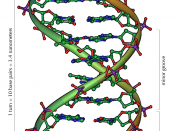Many people do nothing about the future. After all, the future will occur momentarily, whether they plan for it, benefit from it, or are surprised by it. People's expectations about the future, however, often run to extremes. For example, the archetypal 1950s' concept of the year 2000 consisted of flying machines in every garage and robots as servants. Yet, today's advances in the medical and computer fields have transcended anything imagined a few decades ago. (David 2001)Because of the reactive nature inherent in the daily workings of their profession, law enforcement officials also tend not to overly concern themselves about the future. After all, most law enforcement efforts, as well as training, focus on responding to existing threats to the public's safety. Even those law enforcement professionals concerned about the future and futures research usually concentrate on the next budget year, rather than on a five or ten year strategic plan for their agencies.
But, the future is here and probably changing faster than anyone can envision. Many people can remember a world without automated teller machines or the ubiquitous cell phone, but these items, not to mention computers, have changed the world to the point that society no longer can function the way it did in the past. To this end, law enforcement professionals must understand the importance of futures research. To help illustrate this, the authors present three scenarios that depict probable, possible, and preferred outcomes of the future. Each scenario then poses a question that all law enforcement agencies should answer based upon their preparedness to handle similar situations. (David 2001)One of the most often discussed items within the law enforcement community centers on where the profession is headed. What will transcend its current efforts? In short, what comes after community policing? Futures research may constitute the...


